WHO WE ARE
Our Insights
Articles


This report, developed by The Bridgify Group, LLC and El Puente Institute™ in collaboration with the City of El Paso and Workforce Solutions Borderplex, explores strategies to recruit and retain Generation Z. Based on survey data from 343 respondents, the study highlights Gen Z’s priorities—career growth, flexibility, fulfillment, and inclusive workplaces. Their values are shaped by technology, diversity, and strong family ties. The report recommends investing in tech-driven innovation, entrepreneurship, sustainability, and community spaces to attract and retain Gen Z talent, ensuring a vibrant and future-ready workforce.
Survey Questions Measured:
Survey Design
A comprehensive questionnaire targeting Gen Z (ages 16-27) was developed to measure various aspects of their experiences and expectations
Distribution
An online survey was distributed on behalf of Workforce Solutions Borderplex, the City of El Paso, with community partners' collaboration and online avenues for 30 days.
Data Collection
Responses gathered from 343 Gen Z respondents, covering demographics, education, workforce experiences, and cultural values.
Data Analysis
Thorough data cleaning, statistical analysis, and qualitative assessment of responses were conducted.
Demographics
Generation Z represents a unique blend of cultural heritage, modern values, and evolving aspirations. This demographic snapshot reveals a generation deeply rooted in family traditions, yet eager to carve their own path in an increasingly diverse world. From educational pursuits to workplace expectations, Gen Z showcases a nuanced perspective that balances cultural identity with progressive ideals. We delve into the key characteristics, values, and expectations of this vibrant cohort, offering insights crucial for researchers, policymakers, organizational leaders, and professionals seeking to understand and engage with this influential generation.
Gender Breakdown
The gender distribution among Gen Z respondents is nearly balanced. A small percentage (less than 1%) selected alternate gender options. Notably, among Hispanic respondents, there's a significant skew towards female representation at 64%.
Age Ranges
The survey encompasses individuals ages 16 to 27. Hispanic respondents tend to be younger, which necessarily impacts factors such as educational enrollment and employment status.
Hispanic Heritage and Immigration Status
98% of Hispanic respondents identify as Mexican, reflecting strong cultural ties to Mexico.
Ethnic Diversity & Linguistic
Across Hispanic respondents, a plurality are bilingual; 41% primarily speak Spanish. English and 11% primarily speaking Spanish. This linguistic diversity presents both challenges and opportunities in the education and employment sectors.

Accurately understanding Gen Z’s complex, diverse, globally connected generation through statistically meaningful data reveals the insight, perspective, and roadmap leaders need to make informed decisions to unlock the potential of this exciting generation of employees and workforce trendsetters. What Gen Z wants most from leaders is an urgent question to answer because it affects every type of organization—large, small, for-profit, not-for-profit, local, U.S., and global. Not only is Gen Z the fastest-growing generation in the workplace, but they have unique personalities, priorities, and preferences that set them apart. It’s essential to an organization's success for leaders to understand Gen Z's views and approach to leadership to unlock Gen Z's performance.
This comprehensive 33-question survey explores the experiences and expectations of Gen Zers or Gen Z members in or soon to be entering the professional workforce. This survey aimed to investigate challenges, support systems, and factors influencing employee engagement and retention within this demographic. The findings provide insights that can inform inclusive workplace policies, assist organizations in adapting to changing workforce demographics, and identify the skills and experiences valued by this emerging generation. The survey also aimed to investigate various aspects of the career journey, workplace preferences, and the impact of cultural values on the decisions of Gen Z, by understanding the challenges, support systems, and factors influencing employee engagement and retention within this demographic.
Work-Life Balance: Top priority for Gen Z, with 55% of Hispanics considering it extremely important. This reflects a desire for flexibility and personal time.
Growth Opportunities: 52% of participants view career growth as extremely important, indicating a strong drive for professional development and advancement.
Diversity and Inclusion: 36% rate diversity and inclusion as extremely important in the workplace, reflecting the value placed on representation and equity.
Tech-Savviness: Hispanic respondents rank tech-savviness lower compared to their White counterparts, suggesting a potential area for targeted skill development.

Cultural Integration: Hispanic respondents agree on workplace cultural integration, showing a balance between preserving their identity and adapting to professional norms.
Inclusive Hiring: Gen Z emphasizes the need for inclusive hiring practices, reflecting their value for diversity in the workplace and importance to transparency.
Flexible Work Arrangements: Gen Z values flexible work options that accommodate diverse needs and lifestyles,
promoting a more inclusive workplace culture.
Employer Adaptation: Hispanic respondents have lower expectations for employers to adapt fully to Gen Z needs,
showing they’re more willing to navigate traditional workplace norms.
The data reveals Gen Z expectations, preferences, and challenges in the modern workplace. Key themes center around work culture, leadership qualities, diversity initiatives, and career development. We provide insights for employers desiring to attract and retain Gen Z talent.
Implement regular, structured feedback systems that promote open and honest dialogue and encourage transparency. Clearly define job expectations and provide consistent updates to foster a workplace where Gen Z employees feel informed, valued, and motivated.
Cultivate a culture of clear, direct communication and strong interpersonal relationships to support transparent communication practices. These efforts can minimize miscommunications and enhance the overall effectiveness of workplace interactions.
Foster a positive work environment for Gen Z by prioritizing user-friendly and efficient technologies that streamline tasks without adding unnecessary complexity, thereby enhancing job satisfaction and productivity. Implement comprehensive training programs that address the pace of technological change, ensuring that Gen Z employees are well-prepared and confident in using new technologies effectively.
Proactively communicate and demonstrate a commitment to diversity, inclusion, and ethical practices, ensuring these core values are deeply embedded in the organizational culture and daily operations to align with Gen Z's expectations for authenticity and integrity.
Maintain and prioritize continuous feedback and adaptability to employee needs to foster a sense of belonging and respect. Demonstrating these actions in practice, rather than just words.
Prioritize the development of leaders who embody empathy, open communication, and transparency, as these qualities resonate with Gen Z employees and are crucial for fostering a positive and motivational work environment.
Gen Z leaders/managers should adopt a less controlling and more collaborative approach, emphasizing trust-building, teamwork, and clear guidance to effectively support their career advancement and retention efforts.
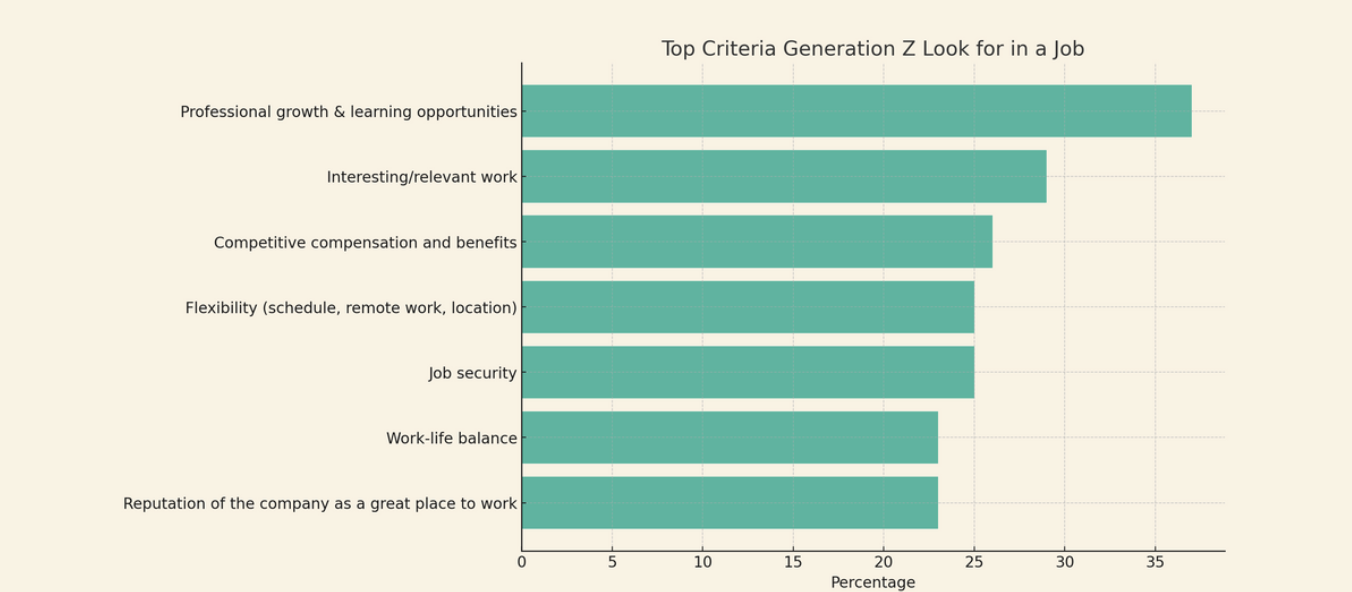
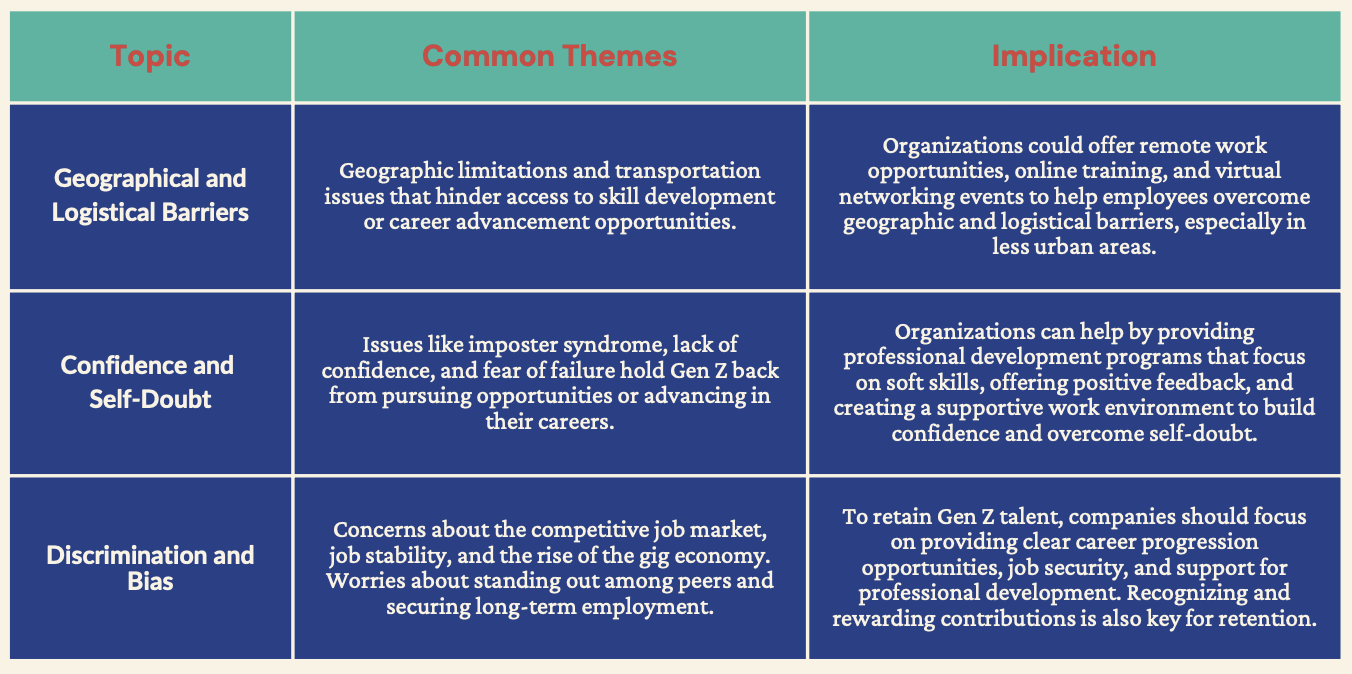
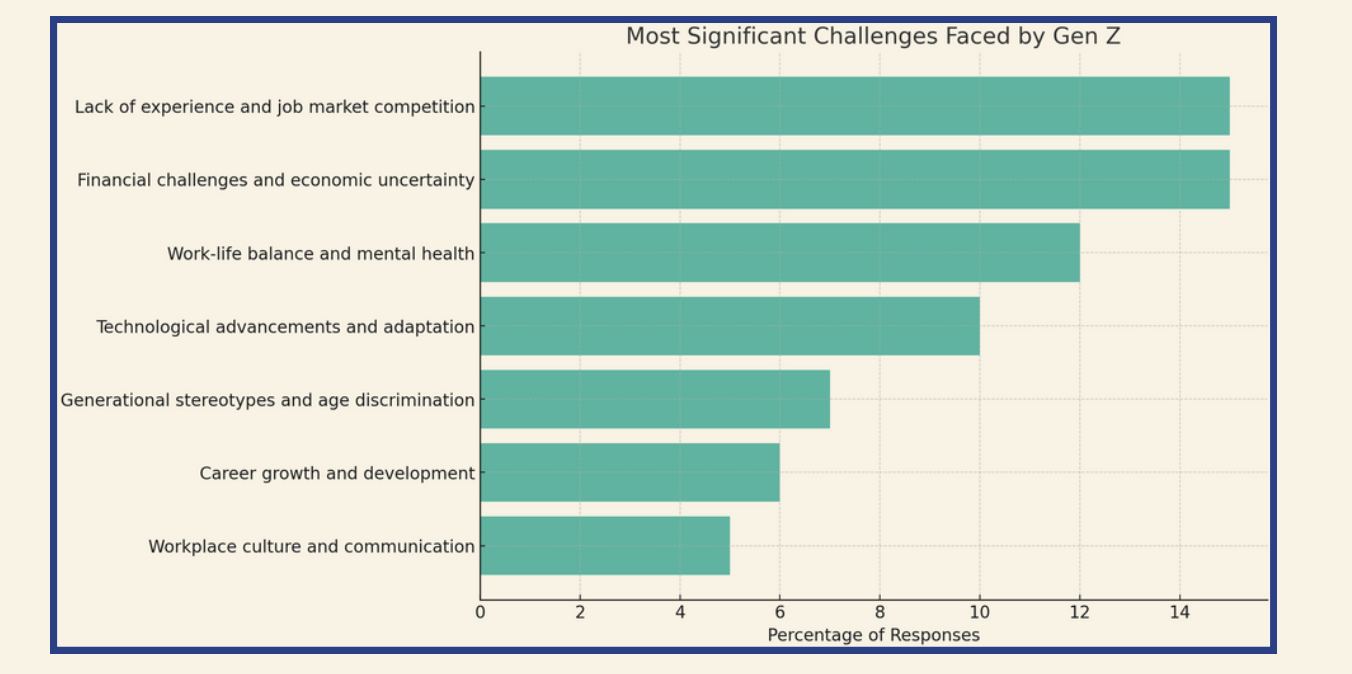
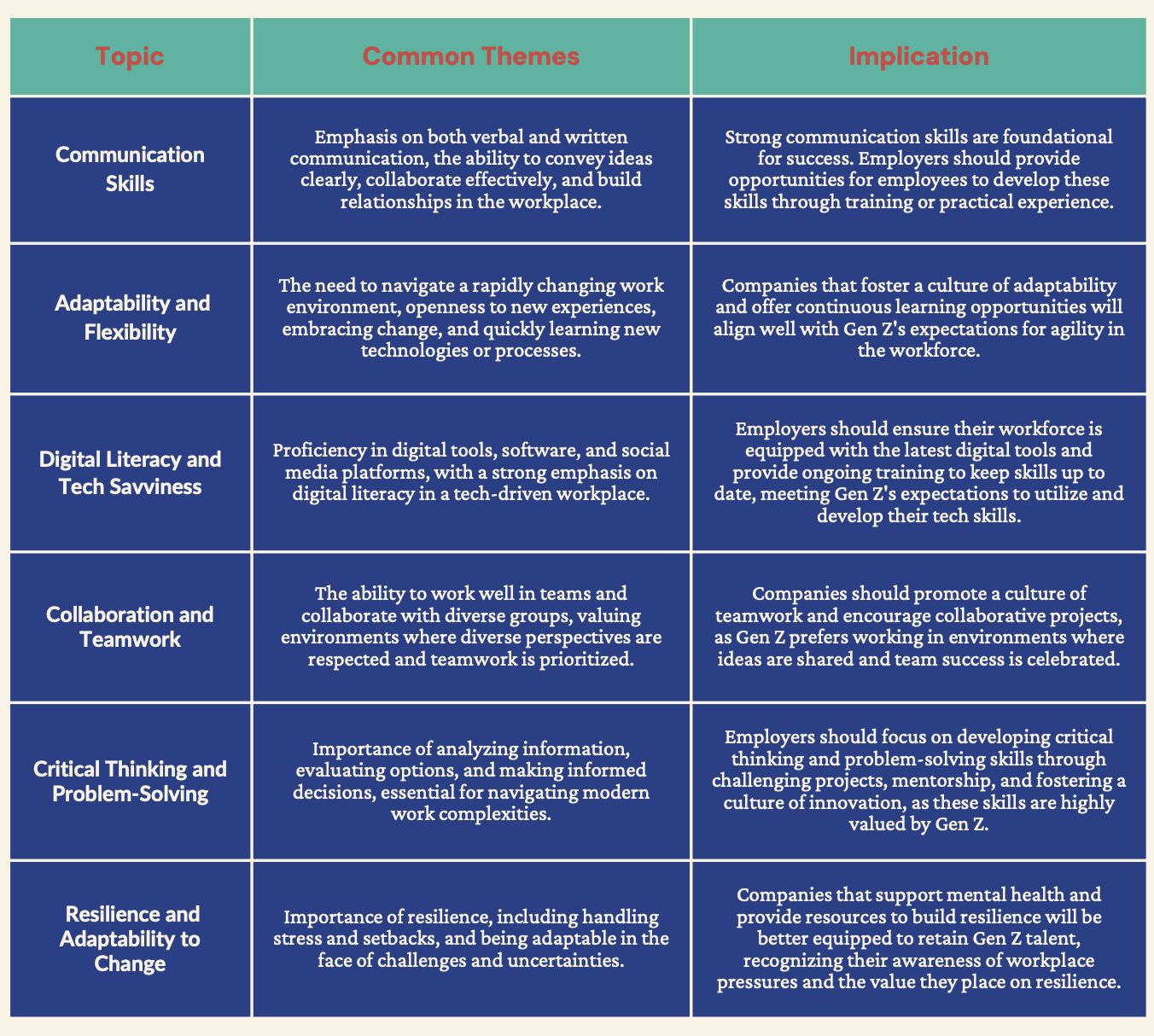
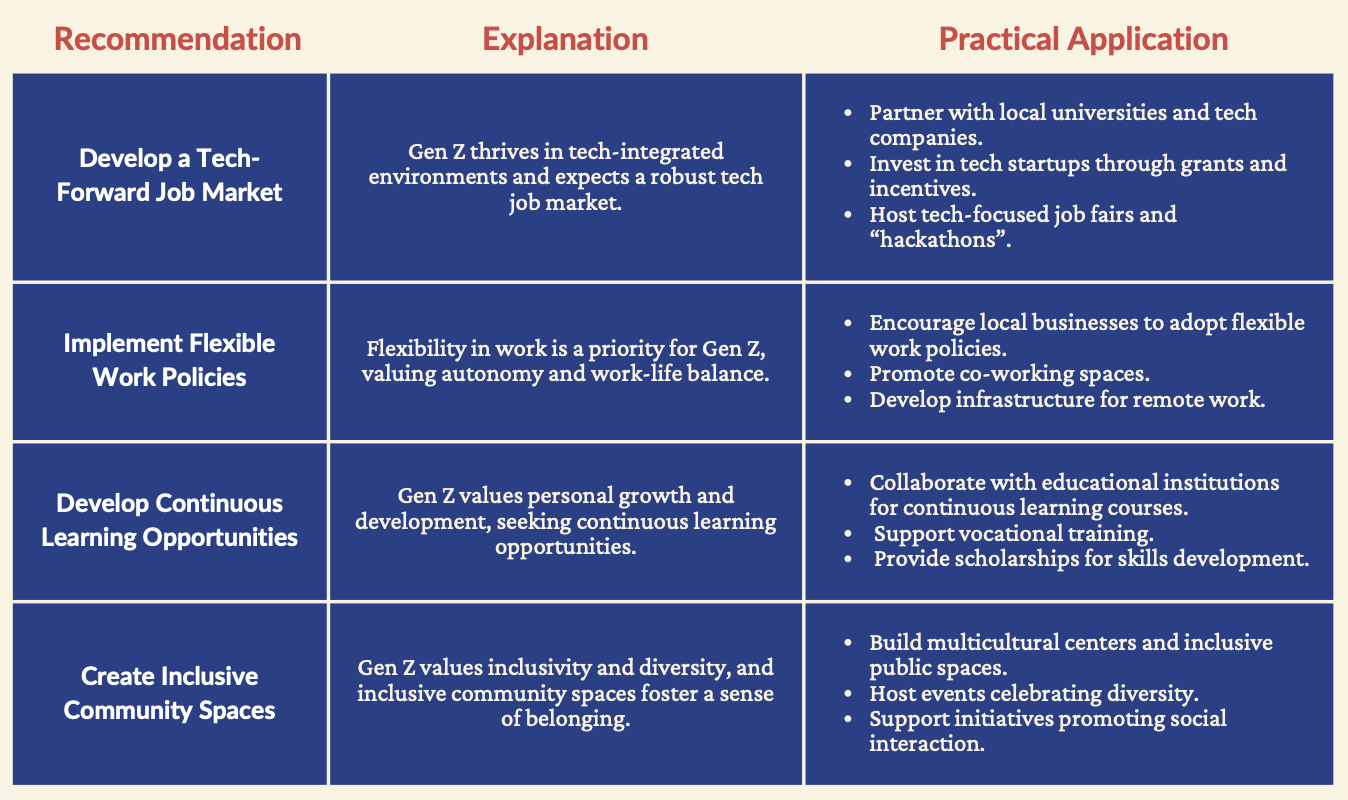
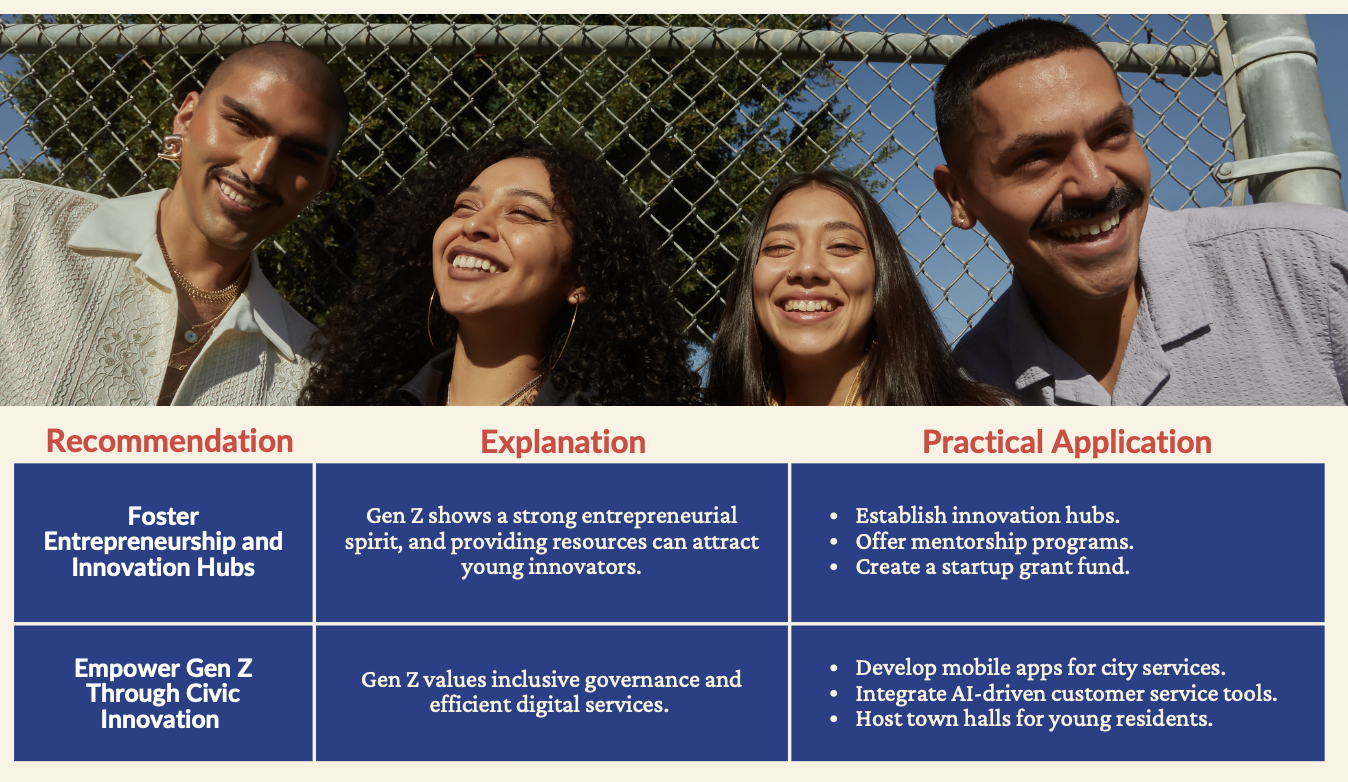
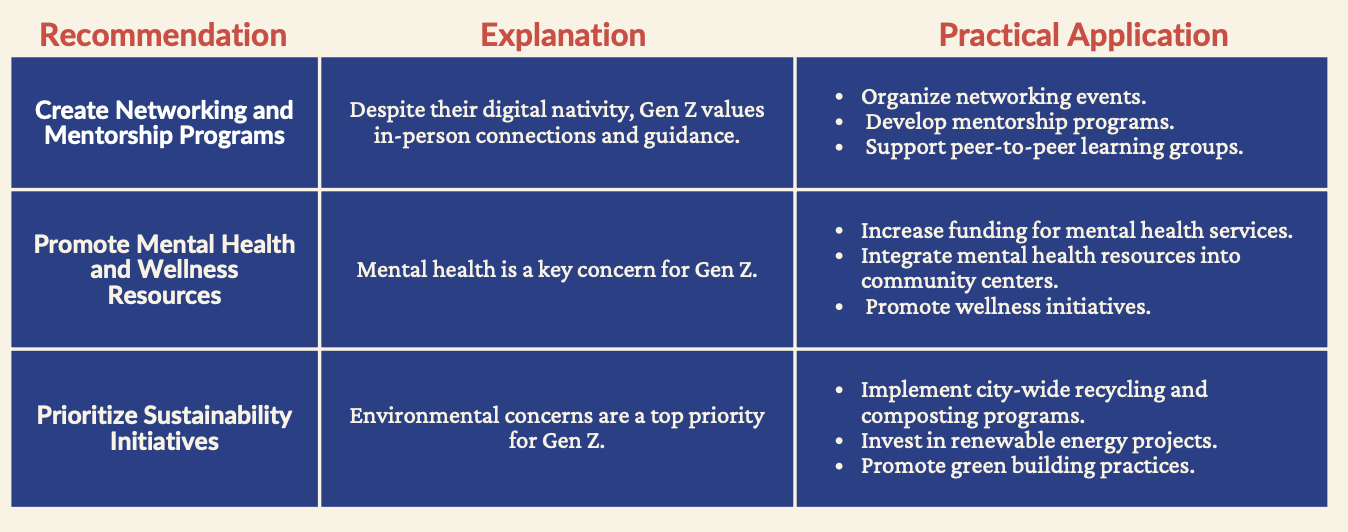
The findings from this research underscore the urgent need for implementing robust strategies to attract, develop, and retain Generation Z talent. Gen Z places a premium on work-life balance, diversity, inclusivity, and expansive opportunities for personal and professional growth. The recommended strategies are rooted in rigorous research and tailored to these priorities. They advocate for the creation of dynamic environments that champion flexibility, continuous development, and inclusivity. By taking decisive and intentional actions based on these insights, organizations can swiftly transform themselves into thriving hubs for this emerging workforce, thereby ensuring sustained economic growth, heightened engagement, and fostering a vibrant, innovative community.